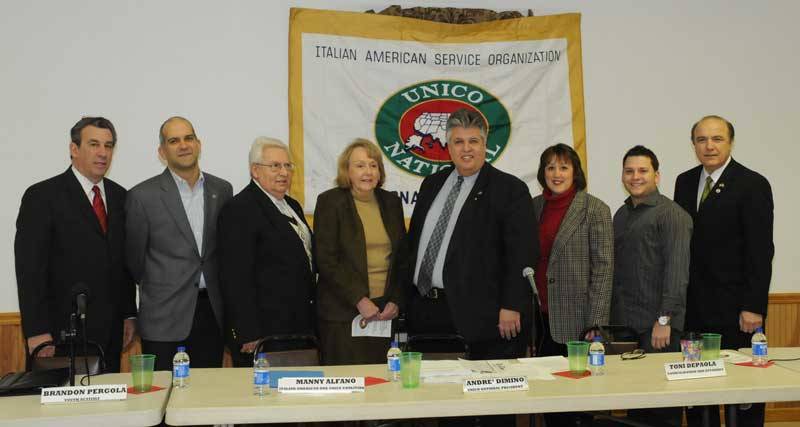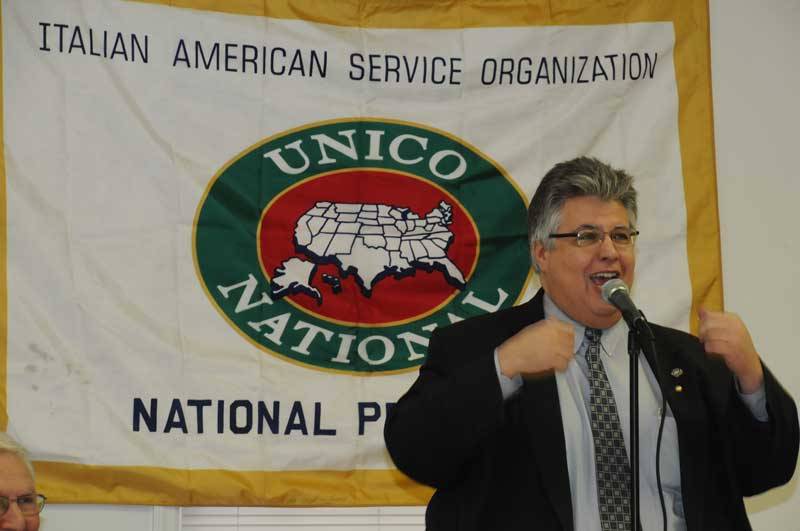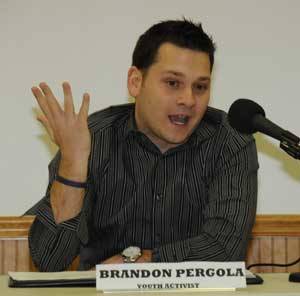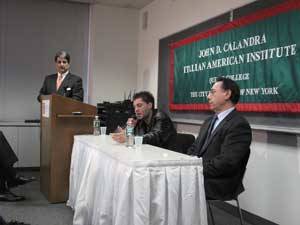S.O.S. UNICO Challenges MTV
Titled S.O.S. (Summit On the Shore), the meeting was sponsored by the Anti-Bias Committee of UNICO National, the largest Italian American service organization in the US. It featured several guest speakers, including UNICO President Andrè DiMino; writer and TV host John DiPietro; former NJ assemblyman Paul DiGaetano, prime sponsor of the legislation that gave birth to the NJ Italian & Italian American Heritage Commission; Toni DePaola, a newly elected councilwoman in Point Pleasant, NJ; the Chairman of Italian American OneVoice Coalition Manny Alfano; and Brandon Pergola, a 28 year old member of the Passais Valley Chapter of UNICO who represented the bond with new generations.
One guest was noted for her absence. It was the MTV CEO Judith McGrath, who the organizers lamented had not even bothered to respond to their repeated invitations. The chair assigned to her was symbolically kept empty at one end of the table. UNICO president DiMino, however, told the audience that MTV Director of Programming Tony DiSanto did respond, but had to decline due to serious health reasons. DiMino tanked him and wished him well.
This episode characterized the atmosphere of the meeting: even if all of those who were present were harshly critical of MTV and firmly requested that the show be suppressed, the discussion was extremely calm and civil. Given the fact that in the last few weeks some exponents of the community—also noted for their absence on Saturday—had gone over the line with inordinate rage and offensive personal attacks, this was in itself quite an achievement that must be credited to the national leadership of UNICO and the other organizations attending.
After watching an interesting video containing various examples of negative portraits of Italian-Americans both from Jersey Shore and other TV programs, as well as a collection of television appearances of Mr. DiMino on the subject, the discussion focused on three subjects: the term “guido”, seen by the participants as a derogatory term to indicate Italian-Americans; the existence of groups of young people who identify themselves as “Guidos,” considered a marginal phenomenon, unrepresentative of Italian-American youth as a whole; and the negative impact of the MTV show on how Italian-Americans are perceived in the US.
John DiPietro gave a brief introduction on the power of television today and the damage the “Guido stereotype” is doing to the whole community—especially outside the NY-NJ area where people have little or no knowledge of “real” Italian-Americans and form their perceptions on the basis of what the media broadcast. At the end of his talk, Di Pietro gave the telephone numbers of a few MTV executives, urging everyone to call them and ask for the series to be cancelled.
Manny Alfano showed his proverbial eloquence by starting with a quote from Steven Spielberg, the much-criticized producer of Shark Tales: “We are in a race against time for the conscious mind of our people.” The prejudice against Italian-Americans, as he continued, “is the most tolerated intolerance in the US,” and all Italian-Americans should stand up against such humiliating bigotry and raise their own, united voice: “If you say nothing, if you do nothing—you will surely become nothing” concluded Alfano.
Nowadays what you see on TV “is real”, said former Assemblyman Paul DiGaetano noting that this applies by definition to so-called “reality shows” such as Jersey Shore. And this explains why MTV is not only insulting Italian-Americans, but the whole New Jersey. DiGaetano said that travelling around the country he noticed that New Jersey is known mainly for two things: the Sopranos, and corrupted politicians; to which this “Guido thing” is now to be added.
Differences of opinions
DiMino acknowledged that not all Italian-Americans have the same feelings on the subject. He said he had spoken with “many” people who advised him not to make a big deal out of this. “Live us alone, we made it, after all.” Respectful, but unconvinced, DiMino’s answer to these objections is clear-cut: “if you want to think this way, do it—but please, get out of our way and let us do our business.”
Brandon Pergola somehow echoed him, offering a different generational perspective: “Many young people tell me “don’t put the show down, I enjoy it, I love it!”. I understand why they may enjoy it, said Pergola, “but don’t they see what it is doing to us?” Because of MTV many young people have come to accept the fact that it is all right to be a ‘Guido!’”.
This was not readily understandable to everyone and indeed the generational gap may be the explanation. Assemblyman DiGennaro, for instance, said that “In my 56 years of life I have never heard the 'G' word used in a positive manner.”
Councilwoman Toni DiPaola, insted, acknowledged that young people who proudly call themselves “Guidos” are an established reality within the Italian-American community. They have been out there “playing bimbos and buffoons for decades,” she said, “and they are not improving.”
However, DiPaola stressed that they are a marginal phenomenon: “These Guidos are not the kids we are raising,” and the world should know about “our college educated, heritage conscious children.” The vast majority of Italian-American youths behave very differently than the Guidos, confirmed Bradon Pergola: “We were told by our parents that it is OK to go out and have fun, but you should never disgrace your family and the place we came from.”
During the Q&A section the same issue was brought back and looked at from different angles and in the same calm, though indignant tones. An interesting point of view was proposed by
Santina Haemmerle, president of the Commission for Social Justice of OSIA, who underlined that, if the Jersey Shore does a disservice to Italian-American men, what it does to Italian American women is even worse, referring to the way female characters are depicted in the show. And others in the audience added with disgust that the show also features “girls kissing other girls,” thus adding insult to injury.
The last speaker from the floor was Fred Garadaphe, Distinguished professor of Italian-American Studies at the John D. Calandra Italian American Institute/CUNY. Referring to a recent controversy born from the Institute’s decision to hold a colloquim entitled “Guido: An Italian American lifestyle,” he lamented: “we wanted to understand more about Guidos, but you criticized us!” Professors may not be as effecive as others but this is what they do, they try to understand things, as he continued: “And we do need to know more, we need to understand why some of our kids behave like this.” Garadaphe recognized of course that not all the children of Italian Americans are guidos, noting that his daughter is a university teacher and his son works at the White House (“something untikable in the past.”) This notwithstanding, he stressed that the Guido phenomenon is there, it is an existing subculture within the Italian-American community and it is not a creation of the media: “it is part of us and it is first and formeost our responsibility to go to these kids’ parents and ask them ‘aren’t you ashamed of your kids? what did you teach them about us and our heritage and culture?' This is what we should do. Meanwhile—the Professor concluded—shame on MTV.”
In the meantime, however, Jersey Shore has reached almost 5 million viewers and, on the very same day of the S.O.S. meeting, MTV announced a second season of the show this summer with 12 new episodes. We shall have to wait and see whether the protests of the Italian-American organizations will have any effect on that decision.





































i-Italy
Facebook
Google+
This work may not be reproduced, in whole or in part, without prior written permission.
Questo lavoro non può essere riprodotto, in tutto o in parte, senza permesso scritto.